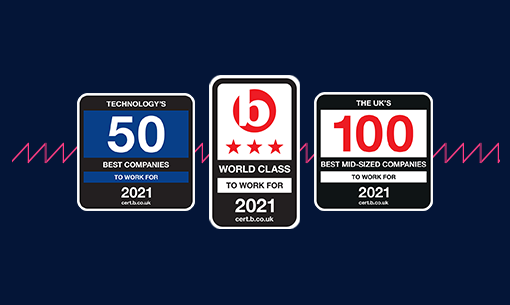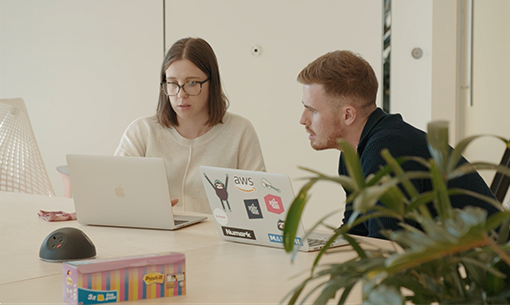Meet Peak: Kuldeepak Singh, Engineering Manager
By Elena Kulikova on November 8, 2021 - 5 Minute ReadJoin us as we meet the people behind the tech! Hear about our team's career journeys so far, hobbies, their favourite bits about the business and much, much more. Today, Engineering Manager Kuldeepak Singh is in the hot seat. He'll be talking all things Peak, answering tech-savvy questions and sharing his view on the future of AI in India.
Hey Kuldeepak, it’s great to have you. Could you chat through your background?
I am an electronics engineer by training. In short, it means I most probably should have been building the next model of iPhone. Jokes apart, at the early stages of my career journey, I realised my calling was different. I started as an embedded engineer at Bosch developing safety-critical software and algorithms for passive safety systems implemented in a car. These algorithms are responsible for timely airbag deployment after car crash detection. Later on, I worked on connectivity systems at Samsung and shortly after moved to Amazon. Throughout my career I wore different hats; however, I have always wanted to get my hands on AI-related products. Now I’m working as an Engineering Manager at Peak.
That’s impressive! How did you become an Engineering Manager?
I have never aspired to be an Engineering Manager; my transition from a full-stack developer happened quite naturally. I like connecting the dots to see a bigger picture, so I took more responsibilities like hiring and mentoring Engineers working with various stakeholders like TPMs, product managers, cross-team managers, UX designers and Principal Engineers. Eventually, I outgrew my initial role and was offered a step up as an Engineering Manager.
It was fascinating how Peak was focused on measurable, specific outcomes and delivering real-world benefits through AI.
Kuldeepak Singh
Engineering Manager
How did you come to know about Peak?
I kept abreast of the latest tech news; while browsing, I found a TechCrunch article about Peak’s Series B funding. It was fascinating how Peak was focused on measurable, specific outcomes and delivering real-world benefits through AI. The vast majority of AI models don’t get deployed, and most don’t deliver tangible results so a company that’s outcome-focused in the space is unusual. So I decided to connect with the co-Founder at Peak, Atul Sharma. This is how my journey as an Engineering Manager at Peak started.
Fantastic, very inspiring. Could you give us an overview of the projects you are currently involved in at Peak?
Let me give a little bit of context. Profoundly there are three technical stages of a Decision Intelligence journey. The first is a data ingestion, where we’re getting the customers’ data onto Peak platform. The second includes processing, where we are implementing AI and ML algorithms to drive the value for the business insights. The final part is an outcome that includes detailed, actionable information for our customers to direct their business decision-making.
My team focuses on the third part, the outcome of ingested data, to be exact data exploration and visualisation. It’s important to understand that visualisation takes different forms for different industries. For example, for a retail business, the visualisation is centred mostly around customer behaviours, engagement, purchase insights, and demographic distribution.
So, we have built a highly configurable and pluggable system within the Peak platform, enabling different businesses to explore and visualise their data in the best possible way. We have built connectors and data bridges with partners such as Snowflake and AWS, so we never restrain our customers by enforcing a specific tech stack; instead, we empower them to pick the stack they are comfortable with.
You’ve mentioned there were no tech limitations for the customers; what about the Peakers?
The philosophy of work at Peak is based on the freedom of choice. I don’t dictate to my team which tools to use, I focus on the outcomes they deliver. Of course, we have all-time team favourites like React JS for leveraging the Micro frontend architecture for front-end development. The back-end team is more inclined towards Node JS with TypeScript and Python with flask framework. Moreover, we are heavy users of open source technologies like Superset and Druid, to name a few. As a certified AWS Advanced Technology Partner, we develop and host our services using AWS technologies. It guarantees our customers rapid, seamless implementation, data safety and fast ROI.
How would you describe the agile practices you use?
We follow Scrum methodology as our product development strategy. The work starts from biweekly sprints and before every sprint team grooms user stories from the product backlog and estimates these stories using planning poker with a modified Fibonacci sequence.
This product backlog is something that product owners continue to refine throughout the sprint to ensure stories are already prioritised, and they have all necessary details before the planning meeting. We also track and use our team’s velocity information each sprint to estimate what we can deliver. Moreover, it provides the grounds for measuring our performance and calculating how we improve on specific metrics.
I would also mention our daily Scrums, which helps us to assess our progress towards the sprint goals. This methodology allows us to establish a good rapport with the team in the UK and India, ensuring our goals are aligned.
Finally, at the end of each sprint, we do our retrospective to discuss what went well during the previous sprint and what we can improve for the next one.

You walked us through the technical practices. Is there anything you do for your team’s wellbeing?
I want to emphasise that we don’t just work together, we care about each other. We have bi-weekly informal 1:1 meetings – a private space to talk about family, concerns, wins, plans for the future, even history, pets or music. I’m not directing the conversation, I’m empathetically listening. It helps me to build meaningful relationships with each person in my team.
You mentioned you must be connected to each team member on an individual level. What are the main points you’re paying close attention to while hiring new talent for your team?
I’ll be very straightforward on this one – I don’t pay attention to the degrees and honours. Instead, I will base my decision on how the candidate exemplifies Peak values. Of course, experience is also important: the problems candidates have worked on and their certifications. Last but not least, I’ll be evaluating compatibility with the team. It’s crucial to create a friendly, open environment where each person is comfortable to be their authentic self.
Who is this ideal candidate for Peak?
The best candidate for me is the person who manifests Peak’s five values: smart, curious, open, driven and responsible. Peak is at the forefront of Decision Intelligence, and we unravel problems that have never been solved or even tackled before. Each team member is passionate about what we do here, and it’s essential to keep this spirit.
Recently we had a Pune Hiring Day targeting Senior Software Engineers in Pune. The leitmotif of the interviews was to uncover what mathematical problems the candidate dealt with and the outcome. I have suggested candidates who were not only technically sound but also passionate about what we do.
To be fair, it’s not enough to be capable of building a fantastic product, it’s essential to be comfortable working with the team. Everyone at Peak is open and goal-driven, we work as a team, not as isolated individuals. We channel our efforts towards creating a great environment.
Sounds great. My last question for today is how do you see the future of AI in India?
I think AI has a very promising future in India, and we are already witnessing it. AI can create a tremendous incremental value to various sectors like retail, manufacturing, healthcare, education, energy, and agriculture. The best part is that many businesses have also started to realise it and harvest the full potential of AI.
I have seen a fundamental shift toward a clear understanding of data value in the past five years. The positioning of leveraging AI in businesses is changing from an afterthought to an essential part of their day to day business decision making. Our customers in India have already seen the tremendous benefits of using AI in their business. I’m confident that most businesses will have AI as an integral part of their decision-making in the next five years.
Great! Well, thank you for your time Kuldeepak – it has been great to chat!
Interested in a career with Peak?
Take a look at our India careers page to browse our current vacancies.
More from Peak

Peak seals 3-star Best Companies accreditation for the second successive year



